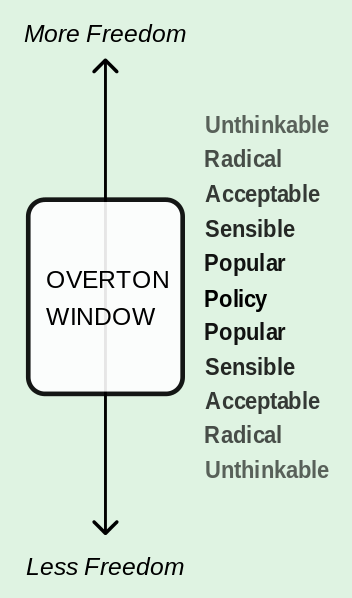The Wikipedia entry for Overton window reads:
The Overton window is a term for the range of ideas tolerated in public discourse, also known as the window of discourse. The term is named after Joseph P. Overton, who stated that an idea’s political viability depends mainly on whether it falls within this range, rather than on politicians’ individual preferences. According to Overton, the window contains the range of policies that a politician can recommend without appearing too extreme to gain or keep public office in the current climate of public opinion.
Overton described a spectrum from “more free” to “less free” with regard to government intervention, oriented vertically on an axis, to avoid comparison with the left-right political spectrum. As the spectrum moves or expands, an idea at a given location may become more or less politically acceptable. Political commentator Joshua Treviño postulated that the degrees of acceptance of public ideas are roughly:
- Unthinkable
- Radical
- Acceptable
- Sensible
- Popular
- Policy
The Overton window is an approach to identifying which ideas define the domain of acceptability within a democracy’s possible governmental policies. Proponents of policies outside the window seek to convince or persuade the public in order to move and/or expand the window. Proponents of current policies, or similar ones, within the window seek to convince people that policies outside it should be deemed unacceptable.
There’s also a helpful illustration of the concept:

Diagram of the “Overton Window”, based on a concept promoted by Joseph P. Overton (1960–2003), former director of the Mackinac Center for Public Policy. The term “Overton Window” was coined by colleagues of Joe Overton after his death. In the political theory of the Overton Window, new ideas fall into a range of acceptability to the public, at the edges of which an elected official risks being voted out of office.
Illustration by Hydrargyrum via Wikimedia Commons
To move the Overton window is to shift how the public considers certain ideas, making once unthinkable things merely radical, then acceptable, and so on. Shifting the window is usually something that takes time and media preparation, as a series of tweets from Zach Goldberg handily illustrates:
1/n Spent some time on LexisNexis over the weekend. Depending on your political orientation, what follows will either disturb or encourage you. But regardless of political orientation, I'm sure we can all say 'holy fucking shit'
— Zach Goldberg (@ZachG932) May 28, 2019
2/n Here's 'holy fucking shit' #1 pic.twitter.com/KRVBl6ucIo
— Zach Goldberg (@ZachG932) May 28, 2019
— Zach Goldberg (@ZachG932) May 28, 2019
— Zach Goldberg (@ZachG932) May 28, 2019
The full thread can be viewed at this Thread Reader link.



